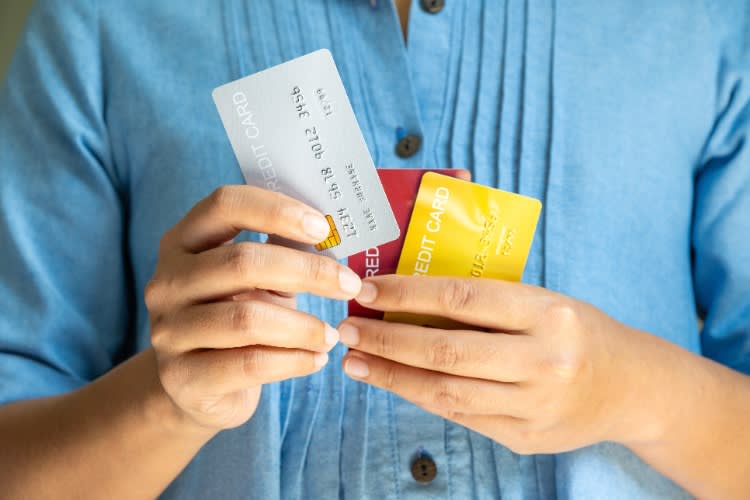
Building Credit Responsibly: Best Practices for Credit Card Use
If you need to build credit for the future but are unsure how to go about it, getting a credit card can help. Some credit cards are easy to get approved for with limited or no credit. Plus, they offer a quick and straightforward way to prove creditworthiness through responsible use.
That said, there are pitfalls to be aware of when using credit cards. These include the potential for overspending and long-term debt, as well as the possibility you'll actually hurt your credit score.
If you want to get the most out of credit while avoiding the downsides, note these best practices for credit card use and the steps to maximize their positive impact.
Building Credit With a Credit Card at a Glance
While unsecured credit cards that don't require a cash deposit as collateral can help you build credit, many credit newcomers struggle to get approved.
Secured credit cards requiring a refundable deposit can be much easier if you have limited or no credit.
Steps to build credit responsibly with a credit card include avoiding the temptation to overspend, keeping credit utilization in a reasonable range, and never missing a payment.
Other credit-building tips include setting up autopay on your account to ensure you pay your bill on time and becoming an authorized user on another trusted person's credit card.
How to Build Credit With a Credit Card: Expert Tips
If you're wondering how to build credit with a credit card without harming your credit or getting into debt, you’re already on the right track. The following expert tips can help you build credit fast — and with the best results.
Explore Secured Credit Card Options
You're one step ahead if you already have a credit card and plan to use it to build credit. If not, you'll need to start looking for cards you can get approved for based on your credit rating and account history.
When unsecured credit cards don't seem to be an option, look into secured credit cards that require a small cash deposit (usually starting at $49 to $200) as collateral. These cards are incredibly easy to get approved for; they report to the credit bureaus, and you can get your deposit refunded when you close or upgrade your card in good standing.
While secured credit cards may approve you when others will not, credit expert John Ulzheimer says to remember that these cards aren't optimal since you have to come up with a deposit. Secured credit cards also have some usability issues.
"The limits are usually very low because of the deposit requirement," Ulzheimer says. "That means they're easier to heavily leverage, which is not good for your scores."
For example, if you put down a $200 cash deposit for a secured credit card, that $200 becomes your credit limit. If you're not careful, that amount would be incredibly easy to max out.
However, Ulzheimer says the advantage of secured credit cards is they're very easy to get approved for with or without a credit score.
"That means they're a good tool for building and rebuilding," he says.
Compare and find top credit cards.
Keep Your Credit Utilization Below 30%
Credit expert Julian Kheel of Points Path says that when you finally get your hands on a credit card, you should never buy more than you can afford just because you have extra credit.
"When you spend beyond your means and can't make more than the minimum payment, you'll start being charged huge amounts of interest, to the point that it can be almost impossible to get back above water," he says.
Kheel adds that you'll have the best results with your credit if you keep your utilization on the low end. This advice makes sense considering the amount of debt you have on your cards is the second most important factor that makes up FICO scores.
"You'll want to avoid spending more than about 30% of your available credit at any given time," Kheel says. "When you start using more than that on a regular basis, your credit utilization ratio increases, which can cause your overall credit score and credit health to go down."
To keep your credit utilization below 30%, keep a balance below $300 for every $1,000 in available credit you have.
Never Miss a Payment
Credit and debt expert Leslie H. Tayne, Esq. of Tayne Law Group, recommends using a credit card often when trying to build credit. Ideally, you can use plastic for small purchases you already have the cash to pay for, then plan to pay off all charges when you get the bill.
"But never miss a payment, as payment history dramatically impacts your credit report and can stay on your record for up to seven years," says Tayne. "Using your credit card often and paying it off quickly can show that you are efficient with managing debt, which is favored by credit lenders."
Set Up Automatic Payments
If you're someone who stays on top of their finances and doesn't worry about missing a payment, you may have nothing to worry about. If you're not so sure, credit expert Aaron Hurd of Cards and Points says you should create some safeguards to ensure you don't accidentally pay your bill late and see your credit score suffer.
"Make this easy by setting up automatic payments for the full balance from your bank account," says Hurd.
Most credit cards let you set up automatic payments through their online account management page, which makes this move a breeze.
Don't Carry Debt
Also, remember that credit score myths abound, including the myth that you can help your credit score more if you carry debt each month. The Consumer Financial Protection Bureau (CFPB) debunks this myth clearly on its website:
"Myth: Carrying a balance on my credit cards will improve my credit score," they write. "Fact: Paying off your credit cards in full every month is the best way to improve a credit score or maintain a good one."
Hurd echoes this sentiment, explaining that carrying debt is a completely unnecessary part of the process.
"You don't need to carry a balance and pay interest to build credit," says Hurd. "Simply having a credit card open, using it occasionally, and paying it in full every month will help you build credit over time."
Wait Six Months or More
How long does it take to build credit with a credit card? According to Tayne, that can depend on whether you have any credit established already.
"You can typically begin to see your credit score trending upward after six months to a year of responsible use of a new credit account," she says. "If you have no credit prior to your new credit account, it can take three to six months to establish a score."
In any case, making responsible credit moves during this time, like keeping debt levels low and always paying your bills on time, will eventually pay off.
Become an Authorized User
While having your own credit card is a sure way to build credit, you can also become an authorized user on another person's card. However, you won't want to set up this arrangement with just anyone.
Travel expert Elliot Rosenberg says you will ideally have "someone with a long-standing and perfect payment history on a particular card to add you as [an] authorized user."
When you become an authorized user on another person's credit card, you benefit from their purchase and payment history, as issuers generally report this to the credit bureaus and the information gets added to your credit file. Over time, this can add depth to your credit history and help build your score along with your own use of credit.
Frequently Asked Questions (FAQ)
How Long Does It Take to Build Credit With a Credit Card?
Building credit with a credit card can take up to three to six months or longer. Your timeline depends on your current credit history and whether you already have an established credit score.
How Can You Build Credit Quickly?
If you don't have any credit, you can build credit relatively quickly with a credit card. To get the best results, use the card for small purchases regularly and pay the balance in full each month. As the issuer reports your credit history to at least one of the credit bureaus, you'll begin to build credit over time.
How Can I Build My Credit Fast with One Credit Card?
If you need to build credit quickly and from scratch, look into secured credit cards that let you get approved without a credit score. For example, with the Discover it® Secured Credit Card, users may get approved without a score if they put down a security deposit as low as $200.
From there, Discover says cardholders who make on-time payments for at least six consecutive months can get their deposit back and be upgraded to an unsecured version.

